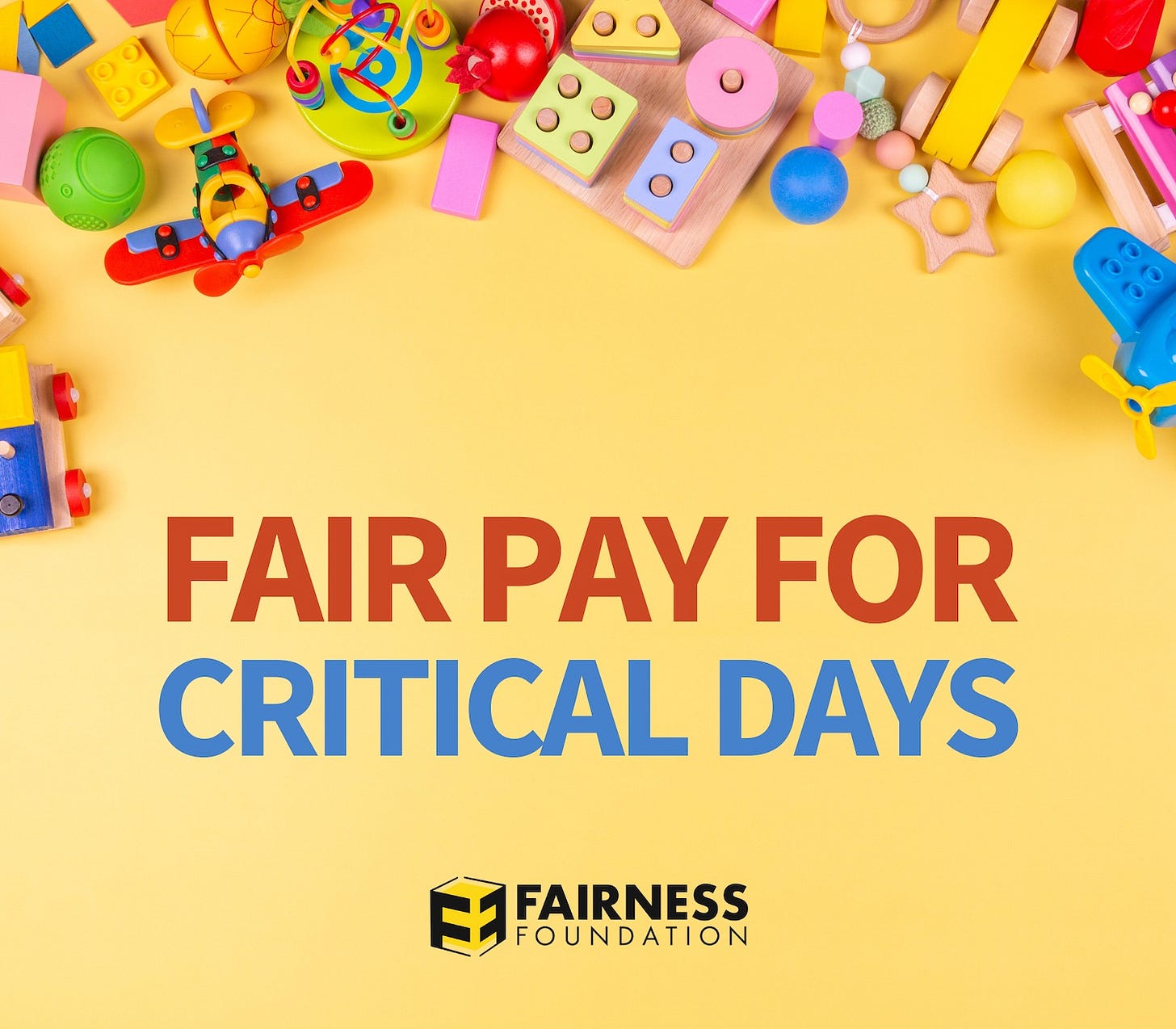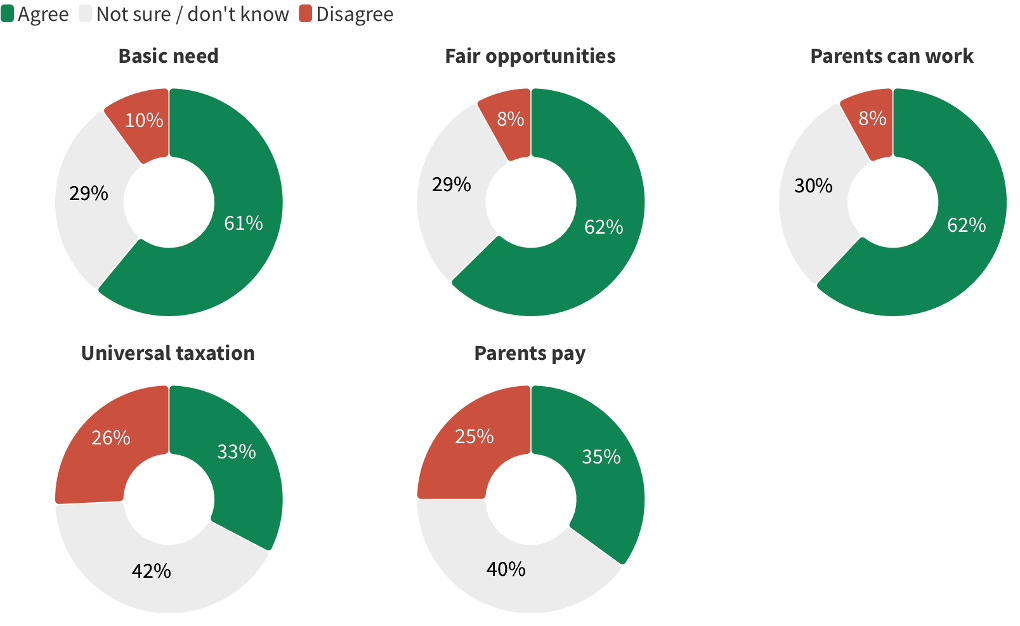Eight in 10 Britons think early years workers’ pay is too low
Our new polling shows that people believe that paying early years workers more fairly would benefit everyone, but also underestimate how expensive UK childcare is compared to other OECD countries
People don’t realise how low wages are for people working in the early years sector, overestimating hourly pay by an average of 47% (£10.90 compared to £7.42)
Two in three are concerned about the costs of early years (nursery / childcare) provision, but people underestimate how expensive it is in the UK compared to other countries
People think workers should be paid more fairly and that this would benefit everyone; 79% think that wages in the early years sector are too low and only 10% disagree
This view unites parents, grandparents and non-parents, men and women, and voters across party lines, including parents who are struggling with childcare costs
Setting the scene
We know that the early years sector in Britain isn’t working. Just ask ChatGPT.
There’s no shortage of reports (a few are listed here) telling us about the wide-ranging and deep-seated problems related to early years childcare and education, which are contributing to poverty and inequality, denying some children the best start in life, and preventing many parents from working as much as they would like, which holds back productivity and growth.
And we know that parents with young children are desperate for change, so that they spend less money on childcare, can work as and when they want and need to, and can be confident that their children are receiving the best quality care and opportunities for development.
But there’s a gap in what we know about public attitudes to one key issue: the fact that workers in the early years sector are severely underpaid (with many paid less than the national minimum wage).
What do people think about this? Is there a zero-sum battle between parents worried about costs and workers focused on wages? Or is there solidarity and a recognition that paying people a decent wage is in everyone’s best interests?
We set out to find out. Read on to see what we discovered from our national polling with Opinium.
Is there a perception gap?
We asked respondents to guess average hourly wages in the early years sector in Britain, and found that people don’t realise how low they are. The average guess was £10.90; in reality, average hourly wages in England are £7.42 (2020 figures).
We also asked them to guess where the UK ranks among OECD countries in terms of childcare costs. The average guess was 14th most expensive out of 38 countries; in reality, the UK is the joint most expensive country for childcare in the OECD.
To test whether exposure to these facts had an impact on attitudes, we only asked these questions of (and showed the answers to) half of our sample; the other half didn’t see them. Comparing attitudes to the questions below between the two groups, we found that presenting people with the facts generally strengthened their support for arguments in favour of increasing pay, although they did not change attitudes to issues such as how much should be invested in the sector and who should pay for it.
Views about pay in the early years sector
Eight in ten people think that pay in the early years sector is too low, with only one in ten saying that it is about right or too high. This consensus holds across party lines, with the same proportion of 2019 Conservative voters agreeing (and a still higher proportion of Labour voters). We found very high levels of agreement about pay being too low among grandparents of young children, people aged 50+, and people who said that the cost of childcare reduces their childcare options or has forced them to leave work or reduce their hours.
What people think about arguments for increasing pay…
Solid majorities of the British public support the full range of arguments for increasing pay for workers in the early years sector. We saw particularly high agreement with the arguments that we should value early years workers as much as others in the education sector, and that we should pay them enough to get by. There was especially strong agreement among grandparents of young children and people struggling with childcare costs.
Quality: Increasing wages is important to ensure that children are given the best quality care and education | Qualifications: Increasing wages will attract and retain more qualified staff to provide better care and education | Valuing workers: We should value members of the early years workforce as much as other staff in the education sector (e.g. teaching assistants) | Absolute pay: We should pay all members of the early years workforce, who provide an essential service to society, enough to get by | Qualifications: It’s not fair to pay members of the early years workforce the minimum wage (or less) while roles such as bankers or large company chief executives earn millions…And about arguments against increasing pay
There is much less support for some of the more commonly cited arguments for keeping wages as they are (such as minimising costs for parents or taxpayers, or arguments about market forces). Parents struggling with childcare costs were among the groups that disagreed most strongly with these arguments.
Minimise costs: Keeping staff wages low is a good way to minimise the costs of early years provision for parents | Minimise spending: Keeping staff wages low is a good way to keep public sector spending and taxes as low as possible | Alternative work: If people don’t like the wages that are on offer in the early years sector they can find work elsewhere | Market forces: Wages should be set by market forces and should not be artificially inflated by the governmentAttitudes to investing in and funding early years provision
People feel strongly about investing in early years provision, reflecting a growing consensus that current levels of funding are unsustainable. More than six in ten respondents agree with arguments in favour of increased government investment in the early years, with Labour voters particularly focused on the importance of early years provision in meeting basic needs (71%) and giving all children fair opportunities (75%), while Tory voters are slightly more focused on ensuring that parents can get back into work (59%). The public are split on whether costs should be borne by taxpayers or by parents.
Basic need: The government should invest in making high-quality early years provision affordable for all parents because it is a basic need, just like primary and secondary education | Fair opportunities: The government should invest in making high-quality early years provision affordable for all parents because it will help to ensure that all children have fair opportunities | Parents can work: The government should invest in making high-quality early years provision affordable for all parents so that more parents can get back into work | Universal taxation: It would be better for everyone to contribute to universal early years provision through universal taxation than for most of the costs to be loaded onto parents | Parents pay: Parents should cover most of the costs of early years provision because they and their children are the direct beneficiariesConcern about the state of the early years sector
There is a striking consensus of concern with the state of the early years sector. Most people are concerned about most aspects (affordability, availability, quality, flexibility, equality and sustainability). This is shared by a majority across party lines, genders and age groups. Affordability tops the list, but equality is not far behind, and there is a telling degree of worry about the sustainability of the sector. Parents and grandparents of young children are, unsurprisingly, particularly concerned about the state of the sector.
Affordability: Parents being able to afford the early years provision that they need, including the impacts of expensive provision on making working worthwhile, gender equality, family budgets etc | Availability: Parents being able to access the early years provision that they need in the local area | Quality: Early years provision that provides both nurturing care and educational development | Flexibility: Parents being able to access early years provision that meets their changing needs | Equality: All children reaching a good level of development by age five, regardless of background | Sustainability: The ability of early years providers such as nurseries to stay in businessUnderstanding why people think what they think
Looking at the relationship between views on low pay for early years workers and views on other questions that we asked, for each of the breakdowns within our sample, we can see that support for higher wages correlates particularly strongly with support for related fairness arguments.
We asked a ‘free text’ question asking people to explain why they support or oppose pay rises for members of the early years workforce. This word cloud shows which words came up more frequently in respondents’ answers.
Methodology and data sources
The questions were designed in consultation with a range of organisations working on early years education and care, and with input from polling experts. Many of the questions link to our five Fair Necessities (essentials, opportunities, rewards, exchange and treatment). All charts were produced using Flourish.
Fieldwork was carried out by Opinium between 1 and 3 March, with a nationally representative sample of 2,000 adults across Great Britain, weighted to nationally representative criteria and various political criteria. The order of options presented in each question was randomised.
The full data tables can be downloaded here.
Read more online
Visit fairnessfoundation.com/critical-days to read this report online. The online version includes:
Visualised breakdowns by a wide range of demographic groupings for every question
Videos of respondents’ views about the issues around fair pay for early years workers
Analysis of polling by other organisations on public attitudes to early years education and care
An expert commentary from Carey Oppenheim at the Nuffield Foundation
Links to related statistics from the Fairness Index and relevant third-party reports
















